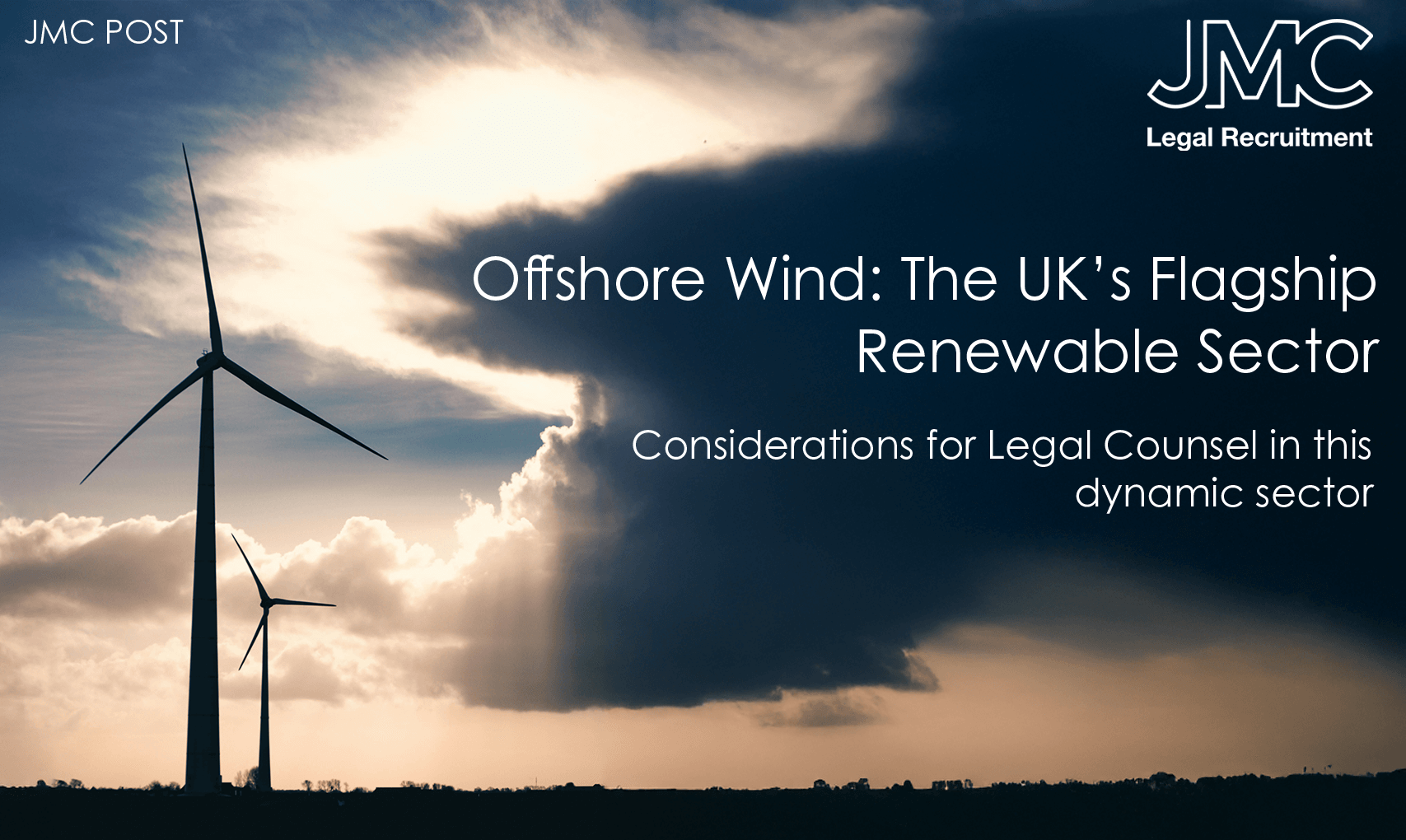
Offshore Wind: The UK's Flagship Renewable Sector
02 Oct, 20245 minutes
In the UK's renewable energy sector, offshore wind has emerged as a key driver in achieving the country's net-zero targets by 2050. With the UK hosting 43% of Europe’s offshore wind capacity, the industry has become a central focus for legal professionals tasked with navigating the complex legal frameworks that govern this space.
What does this mean for in-house lawyers in the renewable energy sector? Offshore wind projects are not only technically challenging but also heavily regulated, making the role of legal counsel indispensable in ensuring that developers meet both national and international obligations.
Securing Legal Rights for Offshore Wind Farm Locations
Offshore wind projects begin with securing the legal rights to seabed locations. The Crown Estate, which manages the UK seabed, plays a pivotal role in leasing areas for wind farms through competitive rounds like Offshore Wind Leasing Round 5. In 2023 alone, the Crown Estate added 10GW to the pipeline of offshore wind projects, bringing the total pipeline to an impressive 93GW.
With estimates suggesting that the UK needs 125GW of offshore wind by 2050 to meet its climate targets, the pace of development is set to increase even further.
This process involves navigating marine planning laws and negotiating seabed leases with multiple stakeholders, which include the Crown Estate, developers, and sometimes local communities. Legal counsel is essential in ensuring compliance with marine spatial planning regulations and anticipating potential disputes over conflicting seabed uses. Moreover, new initiatives like the Whole of Seabed Programme are digitally mapping the seabed to support long-term strategic planning for wind farms and other marine industries.
Environmental and Sustainability Regulations
Environmental and sustainability regulations present another significant challenge in the offshore wind sector. In 2023, UK offshore wind farms produced a record-breaking 49TWh of green electricity, accounting for 17% of the country's total electricity generation—up from 14% in 2022
This milestone, while impressive, places greater pressure on developers to meet stringent environmental standards to mitigate the impact on marine ecosystems.
Legal professionals must guide developers through environmental impact assessments (EIAs) and ensure compliance with evolving regulations on marine biodiversity. As offshore wind farms expand, conflicts with other seabed users—such as fisheries and shipping—become more frequent, requiring legal expertise to resolve disputes in a way that balances commercial interests with environmental stewardship. In 2023, offshore wind farms in the UK saved the equivalent of 18.5 million tonnes of CO2 emissions, further underscoring the sector's role in reducing the nation’s carbon footprint.
Cross-Border Legal Issues and Maritime Law
Offshore wind projects are often located near international waters or cross-national boundaries, introducing a layer of complexity involving international maritime law. The United Nations Convention on the Law of the Sea (UNCLOS) plays a significant role in governing the placement of offshore wind farms beyond national territories. With projects like Dogger Bank, the world’s largest offshore wind farm, situated in waters shared by multiple countries, legal counsel must navigate cross-border agreements to ensure compliance with international laws.
Moreover, legal professionals working on these large-scale projects must manage transmission infrastructure that crosses into international waters. This adds another dimension to contract negotiation and regulatory approval processes, often involving multiple jurisdictions. As more large offshore projects like Seagreen and Dogger Bank come online, the need for expertise in maritime law and international agreements will only grow.
Legal Considerations Around Financing and Power Purchase Agreements (PPAs)
The capital-intensive nature of offshore wind projects means that structuring robust financing agreements is critical for success. In the face of rising electricity prices, developers are increasingly exploring alternative revenue structures to maximise returns.
Power Purchase Agreements (PPAs) play a vital role in securing stable revenue streams over the long term, and legal counsel is central to negotiating terms that balance flexibility with bankability.
PPAs for large offshore wind projects must be adaptable to market fluctuations, which have been particularly volatile in recent years. Legal teams need to anticipate changes in electricity pricing and market regulation while ensuring that agreements are structured in a way that mitigates risk for investors. Given the high capital requirements, developers are also divesting operational offshore wind assets to finance new projects, making mergers and acquisitions a growing trend in the sector.
In 2023, the UK government also introduced significant legislative reforms, empowering the Crown Estate to borrow more and invest heavily in new projects. This will likely accelerate the growth of the sector, further increasing the demand for legal professionals to handle the complexity of financing, leasing, and regulatory compliance.
Conclusion
The offshore wind sector is one of the most dynamic areas in the UK’s renewable energy landscape. Legal counsel plays a pivotal role in ensuring that developers can navigate the myriad of regulatory, environmental, and cross-border challenges that come with building and operating large-scale offshore wind farms. As the UK ramps up its efforts to meet its 2050 net-zero target, the need for legal expertise in this field will only intensify.
From securing seabed leases to negotiating complex PPAs, legal professionals are at the heart of this green energy revolution, ensuring that offshore wind not only meets the nation’s energy needs but also aligns with environmental and international obligations. With offshore wind contributing 17% of the UK's electricity and growing rapidly, the sector presents a unique opportunity for legal professionals to shape the future of renewable energy in the UK.
Sam Thompson
In-House Legal Recruitment Consultant




